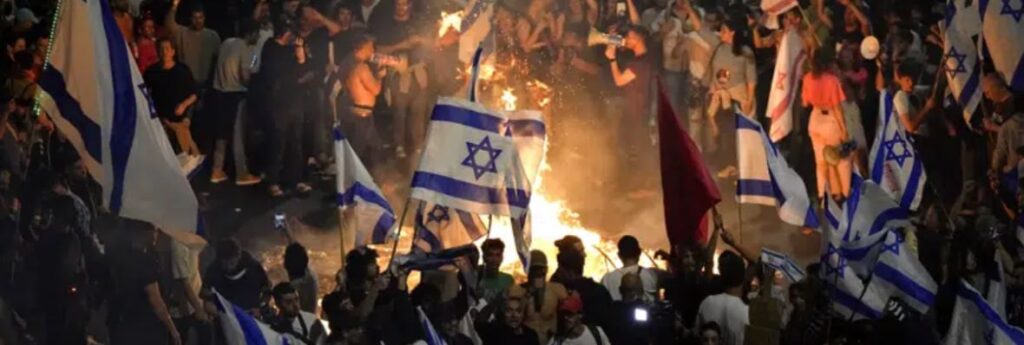Departing flights out of the Israel’s main international “airport” were grounded Monday stranding 70,000 travellers as the country’s largest trade union group launched a strike across a broad swath of sectors, joining a surging protest movement against Prime Minister Benjamin Netanyahu’s plan to overhaul the judiciary – a plan that is facing unprecedented opposition.
The protests prompted Netanyahu to bow to public pressure and announced in a televised address a delay to the legislation for a few weeks. The speech, in which the prime minister said he wanted to “avoid civil war” appeared to calm tensions, but it did not resolve the underlying tensions behind the protests. Even before he spoke, the grassroots anti-government protest movement said a delay was would not be enough.
The growing resistance to the plan came hours after tens of thousands of people burst into the streets around the country in a spontaneous show of anger at Netanyahu’s decision to fire his defense minister after he called for a pause to the overhaul.
The demonstrations were said to be the largest in Israel’s 75-year history.
Chanting “the country is on fire,” they lit bonfires on Tel Aviv’s main highway, closing the throughway and many others throughout the country for hours.
Demonstrations took place in Beersheba, Haifa, and Jerusalem, where thousands of people gathered outside Netanyahu’s private residence. Police scuffled with protesters and sprayed the crowd with a water cannon. Thousands then marched from the residence to the Knesset, Israel’s parliament.
“This is the last chance to stop this move into a dictatorship,” said protester Matityahu Sperber, 68, outside the Knesset. “I’m here for the fight to the end.”
Israeli diplomats in Canada also joined the strike and closed the embassy in Ottawa, and the country’s consul general in New York City, Assaf Zamir, resigned in protest.
The overhaul, driven by Netanyahu, who is on trial for corruption, and his allies in Israel’s most right-wing government ever, has plunged Israel into one of its worst domestic crises. It has sparked a sustained and intensifying protest movement that has spread to nearly all sectors of society, including its military, where reservists have increasingly come out publicly to say they will not serve a country veering toward autocracy.
The crisis has also shined a light on Netanyahu himself, Israel’s longest serving leader, and the lengths he may be willing to go to maintain his grip on power, even as he battles the corruption charges. The firing of his defense minister at a time of heightened security threats in the West Bank and elsewhere, appeared to be a last straw for many, prompting a new surge of opposition.
“Where are we leading our beloved Israel? To the abyss,” Arnon Bar-David, the union group head, said in a rousing speech to applause. “Today we are stopping everyone’s descent toward the abyss.”
The group had sat out the months-long protests but the defense minister’s firing appeared to provide the impetus for the drastic measure.
It was unclear if the strikes would prompt Netanyahu to halt the overhaul.

